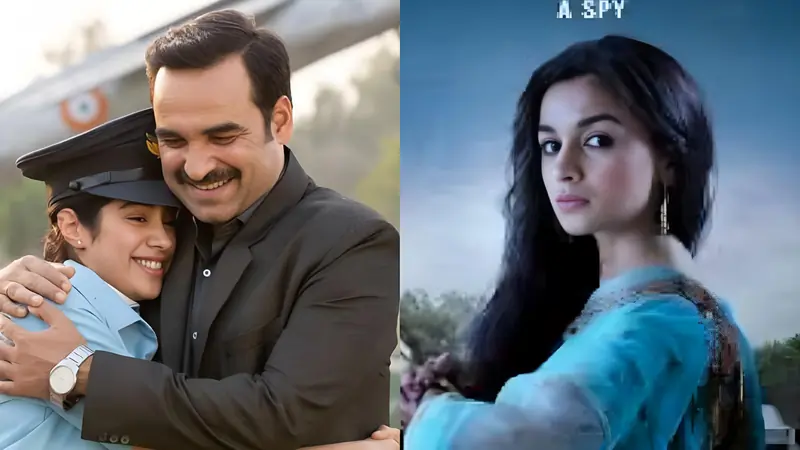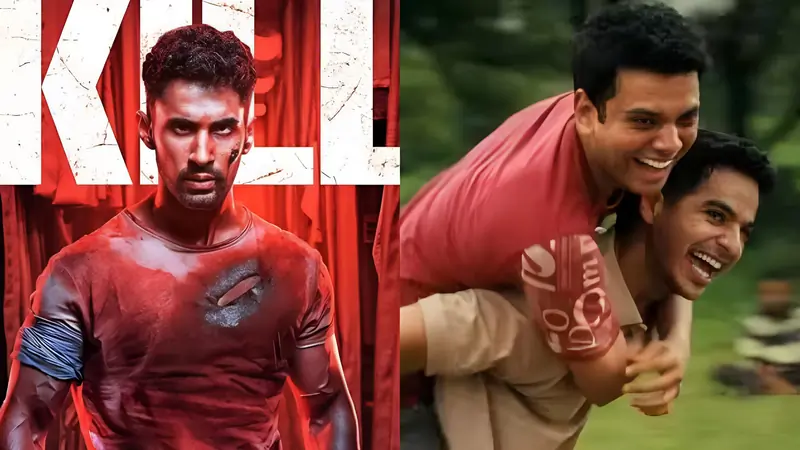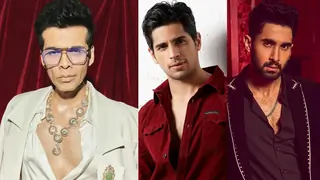The Dharma Shift: Crafting Romance & Credibility: Conscious or Essential?
Something has changed—deliberately, noticeably, and significantly. For Karan Johar to place his banner behind a film like Homebound or Kill is more than just a business decision, it’s a statement. A statement that cinema can be many things at once: pretty and powerful, relevant and romantic.
Published: Saturday,May 31, 2025 14:37 PM GMT-06:00

When you think of Shah Rukh Khan, you can’t help but think of romance. His iconic arms-wide-open stance feels like the cinematic equivalent of the warmest hug ever offered. For decades, Indian films have been synonymous with love stories, accompanied by soaring melodies and vibrant dance sequences—a tradition that, regrettably, has diminished in recent years. And who better than the flagbearers of on-screen romance to rekindle that spark—Dharma Productions. Much like SRK himself, Dharma has become shorthand for both classic and contemporary love sagas, having perhaps crafted some of the most memorable romantic and romcom films in recent memory.
It's both fascinating and a tad melancholic that what was once an overused, almost saturated genre is now facing a creative drought. Romantic comedies? Rare. Straight-up romantic dramas? Scarce. That is, until now.
The Return of Romance: Dharma’s Slate is a Love Letter

We’ll get to the significant shifts within Dharma Productions shortly, but what’s heartening is that even amidst all this evolution, their forthcoming slate features not one, not two, but three romance-driven films, and each of them carries the promise of something special. There’s Chand Mera Dil, headlined by Kill breakout star Lakshya alongside the ever-buzzing Ananya Panday, whose posters and initial buzz have already turned heads. And then, there’s Tu Meri Main Tera Main Tera Tu Meri, featuring the ever-bankable Kartik Aaryan in a romantic lead.
This is Dharma in its comfort zone, territory it knows all too well. Yes, there have been hits and misses recently, but if there’s one production house that breathes the language of love with unmatched fluency, it’s Dharma. And if there’s one person who lives it on and off-screen, it’s Karan Johar. His sensibility and deep understanding of emotional resonance lend these films a rare kind of sincerity.
These aren’t just films; they’re a continuation of an aesthetic, a tone, a cinematic vocabulary that Johar and his team have spent years refining. Whether it’s the pastel-tinged elegance of Kabhi Khushi Kabhie Gham or the fizzy realism of Yeh Jawaani Hai Deewani, Dharma’s romances offer something more than escapism, they give us permission to feel without apology.
Beyond Love Songs and Swiss Alps: The Conscious Shift

Yet, something has changed—deliberately, noticeably, and significantly. It’s not like Dharma hasn’t dabbled outside the realm of romance before. Recent titles like Raazi, Kesari, Bhoot – Part One: The Haunted Ship, and Gunjan Saxena: The Kargil Girl are testament to that. But what feels new is the very intent. Karan Johar himself has spoken about Dharma’s pivot towards critically acclaimed content and collaborating with filmmakers who might never have imagined their scripts being greenlit by Dharma.
Take Kill, for example, a visceral, genre-defining action thriller directed by Nikhil Nagesh Bhat. The film didn’t just make waves; it surfed across global festivals, earned rave reviews, and scored a strong theatrical performance back home. That elusive blend—critical acclaim and commercial success- is something Johar now seems increasingly invested in.
And now, we find ourselves witnessing a collaboration once thought inconceivable: Neeraj Ghaywan and Dharma Productions. It’s a symbolic marriage: the grit of socially conscious storytelling with the gloss of commercial viability. This is a leap of faith not just for Johar, but for the ecosystem at large.
Cannes, Criticism, and Clarity: The Curious Case of Homebound

Enter Homebound. Slated to be a crown jewel in Cannes 2025, this Neeraj Ghaywan-directed film stars Vishal Jethwa, Ishaan Khatter, and Janhvi Kapoor. It straddles both the critical and commercial divide with elegance. Khatter, who proved his mettle with Beyond the Clouds, feels right at home in a film like this. Jethwa’s prowess needs no introduction, and Kapoor continues her balancing act, polishing her acting credentials while maintaining her glamorous star persona.
Yet, above all else, it’s the unlikely association that’s grabbing the attention: Dharma backing Ghaywan. Eyebrows were raised, but for once, the collective reaction seems more impressed than incredulous. It’s a bold gamble, backing a filmmaker who speaks in silences rather than monologues, and whose work digs deep into social structures rather than luxuriating in elite aesthetics.
For Johar to place his banner behind a film like Homebound is more than just a business decision—it’s a statement. A statement that cinema can be many things at once: pretty and powerful, relevant and romantic.
Johar, Judged But Evolving

The transformation of Karan Johar, both the individual and the brand, has been quietly seismic. Known for his flamboyance, his social media candour, and his almost meme-like association with nepotism, Johar has long been a polarising figure. But beneath that image lies a filmmaker and producer genuinely trying to reshape public perception.
It might sound like this piece is veering into a Johar profile, and perhaps it is—but it’s worth noting that Johar often gets an overwhelming share of criticism, while rarely receiving his due for the projects he champions behind the scenes. That contradiction is worth examining. Because the truth is, for every nepotism debate or box office flop, there’s a Raazi, a Kill, or now, a Homebound, quietly countering the noise.
His evolution is not accidental. It is strategic, yes, but it is also deeply personal. His directorial return with Rocky Aur Rani Kii Prem Kahaani wasn’t just a return to form, it was a cinematic argument for coexistence: old-world love layered with new-world chaos. He’s listening, learning, and adjusting, not because he has to, but because he wants to. That’s growth.
Bigger Bets, Braver Cinema

It’s clear that Dharma Productions is intent on diversifying its portfolio, and what’s equally admirable is that it’s doing so without losing sight of business sensibilities. Let’s be honest: there are very few, if any, major production houses in India willing to go all in on content-driven cinema that may or may not rake in the big bucks. Dharma, against all odds and assumptions, is doing just that.
This is what makes the studio’s current slate particularly compelling: a balance between surefire crowd-pleasers and narrative risks. Whether it’s investing in first-time filmmakers or building bridges between glamour and grit, Dharma is taking calculated yet courageous steps.
In today’s cinematic climate, where even star-studded spectacles can collapse under their own weight, Dharma’s bold forays into film festivals and auteur-led narratives feel not just refreshing, but revolutionary. Their choices reflect a belief in the medium as much as the market.
No, This Isn’t a Sponsored Love Letter
Let’s address the elephant in the room. No, this is not a paid puff piece for Dharma Productions. And yes, we know what people think the moment something positive is written about a major production house. But this piece is not about fandom, it’s about fairness.
If we are quick to drag Johar and Dharma when things go awry, we must also be willing to applaud when they get it right. Because what we’re witnessing isn’t just business acumen, it’s creative courage. A massive production house placing its bets on unorthodox stories while still keeping its romantic legacy alive is worth noting, celebrating even.
We may one day reach a point where the lines between ‘mainstream’ and ‘art house’ cease to exist. Until then, efforts like these deserve our attention, not our cynicism. The act of creating cinema is inherently vulnerable, and when someone of Johar’s stature makes that vulnerability public, it deserves recognition.
The Dharma of Dharma

Romcoms or arthouse films. Mega actioners or intimate character dramas. Label them however you like, but it’s all cinema in the end. And cinema, at its best, connects. It compels. It comforts.
When we think of Indian cinematic romance, that silhouette of Shah Rukh Khan with arms outstretched may always be the first image that comes to mind. But beyond that emblematic pose lies an entire industry of emotion, longing, and storytelling: a legacy of love that’s always been our forte.
Now, as Dharma Productions leads the charge both in reviving that legacy and reinventing it for the future, we’re witnessing a moment that feels like both a throwback and a leap forward. And if you ask us, that’s a narrative twist worth standing up and cheering for.
Because sometimes, evolution doesn’t mean letting go of the past. Sometimes, it means embracing it with new eyes and open arms.
Disclaimer: The views and opinions expressed in this article are solely those of the author and do not necessarily reflect the official policy or position of IndiaForums.com, its editors, or its affiliates. Readers are encouraged to form their own views.
Join Our WhatsApp Channel
Stay updated with the latest news, gossip, and hot discussions. Be a part of our WhatsApp family now!
Join NowYour reaction
 Nice
Nice Great
Great Loved
Loved LOL
LOL OMG
OMG Cry
Cry Fail
Fail





























1 Comment